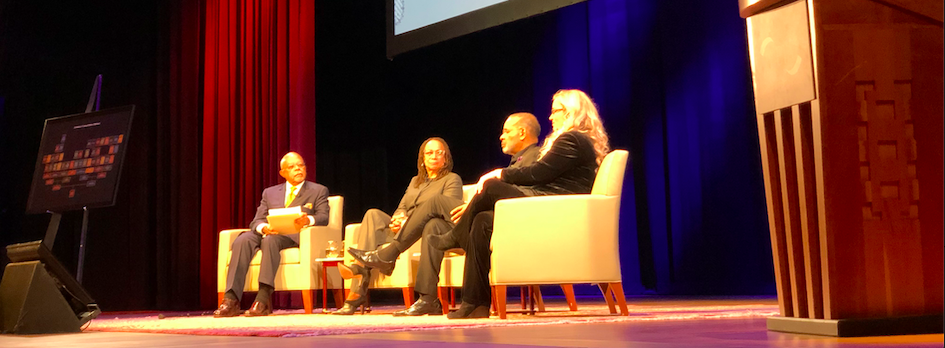WETA, the District’s PBS-affiliate, hosted a screening and discussion of the fifth season of Finding Your Roots with Henry Louis Gates Jr. on Feb. 8 in George Washington University’s Lisner Auditorium. A primary focus of the discussion was the revelation that actress S. Epatha Merkerson is a direct descendant of nine of the 272 enslaved people sold by the Jesuits in 1838 to keep Georgetown financially afloat.
Panelists included moderator Henry Louis Gates Jr. and genealogist CeCe Moore, alongside radio host Joe Madison and Merkerson, who both learned about their family histories in the new season. WETA screened excerpts from two episodes of the new season of Finding Your Roots, centering on the ancestral stories of Madison and Merkerson. In the first half of the preview, Gates revealed to Madison, a civil rights activist and SiriusXM radio host, that Madison’s grandfather was experimented on as part of the infamous Tuskegee syphilis study.
In the second half, Gates spoke with Merkerson, an Emmy and Golden Globe-winning actress famous for her role on Law and Order. Despite her success, Merkerson recounted how she had “always wanted to know” where her family came from.
When she asked her grandmother to tell her about their ancestors, her grandmother responded, “It’s painful. You don’t need to hear any of this.”
Gates explained to Merkerson that the show was able to trace her mother’s family ancestry back to a Maryland slave named Patrick Hawkins, her third-great grandfather. In addition, Gates mentioned that it was rare for slaves in the early 1800s, like Hawkins, to have been “sold by name.”
To Merkerson’s surprise, Gates revealed that Hawkins’ name was found in Georgetown University documents describing the 1838 sale of slaves to “two planters in Louisiana.” The “inventory” compiled by the Jesuits for the sale listed the name of every slave. On the list was five of Patrick Hawkins’ relatives, his wife Letty, his son Peter, and his father Isaac. Georgetown recently renamed the Former Jesuit Residence after Isaac Hawkins following student protests over its original name that honored one of the Jesuits involved in the sale.
Brought to tears, Merkerson responded, “They have names…they have names. They’re not just faceless people.”
In the episode, Merkerson also read aloud the Jesuits’ records that detail the inhumane treatment of slaves at Georgetown. “Generally, the master provided no bedding except a blanket and an old straw sack…Some might think it harsh treatment to make the poor Negroes sleep on the floor, yet it is not hard to sleep thus, for it custom soften things.”
“It boggles the mind…these are men of the cloth,” Merkerson sighed.
After the preview, Gates, Merkerson, and the other panelists began their discussion. Learning that her family had suffered so much at the hands of the Jesuits was a “painful process,” Merkerson said, but she added that “part of the tears is joy,” knowing that her ancestors withstood the pain and hardship they faced on a daily basis. “They lived through it long enough to get to me,” she remarked.
Merkerson reflected on her own upbringing, recounting how her mother, Ann, raised five children on her own. Even though people said that Ann “would never succeed” as a single mother, Merkerson and her siblings all ended up going to college and finding success in their respective careers.
In her parting words to the audience, Merkerson attributed her mother’s resilience to the fact that she is descended from such resilient ancestors. “That kind of strength? It’s bred in the bones.”





